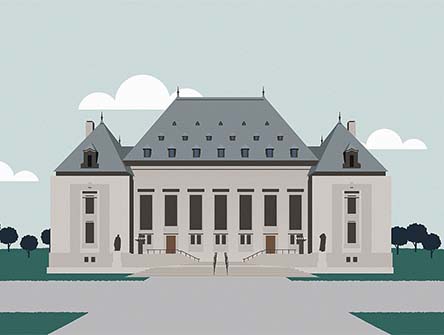The financial arrangements between lawyers and Indigenous clients
They don't always serve the clients well, nor do they make access to justice any easier.
.jpg?ext=.jpg)
Recent decades have seen an explosion of Indigenous case law in Canada, with precedent-setting decisions like R v. Sparrow and Delgamuukw v. British Columbia vastly increasing activity in what used to be a specialized field.
More cases mean more opportunities for conflict between lawyers and their clients over financial arrangements. The past few decades also have seen a significant number of those conflicts make their way to court — disputes over hourly fees, retainers and contingency fees, arguments over who has the right to act for a particular First Nation.
Some professionals in the Indigenous law field say those conflicts are the result of a power imbalance between Indigenous communities and the lawyers they hire. They're calling for reforms to the model code of conduct to protect Indigenous clients from bad actors in the legal profession.
"Indigenous communities have trust issues when it comes to legal services, which comes from a history of lawyers preying on them," said Racquel Fraser of Fox Fraser LLP in Calgary. "And there are a lot more cases of this than are ever reported to law societies." Fraser also discussed the issue at this year's CBA-FLSC Ethics Online Symposium in April.
At the annual Indigenous Bar Association (IBA) conference in November 2021, Fraser and IBA president Drew Lafond, a partner at MLT Aikins in Saskatoon, delivered a joint presentation on reforming the model code of conduct. First Nations governments are particularly vulnerable to exploitation by their legal representatives, said Lafond, because they're typically distracted by unmet basic needs in their communities.
"When you're serving as a member of chief and council, you're drinking water from a firehose every day," he said. "First Nations are involved in massive, hugely complex legal claims that take years, decades to settle.
"And they're trying to manage these claims while dealing with a backdrop of poverty and colonialization that makes it harder to address these claims, particularly when coping with community demands for basic services."
Lafond said the IBA is partnering with the Federation of Law Societies of Canada to review and modify the model code to protect Indigenous clients — starting with changes to the way contingency agreements work.
Contingency fee agreements can get cases off the ground for cash-poor clients, but unless their lawyers are transparent about the work's nature, they can lead to unfair outcomes.
In 2015, Tallcree First Nation in northern Alberta entered into a contingency fee arrangement with Rath & Company to handle an agricultural benefits settlement with Ottawa. The agreement gave the law firm 20 per cent of the eventual settlement — a fee of $11.5 million. A review officer declared the fee to be "not clearly unreasonable."
An Alberta Court of Queen's Bench judge overruled that decision, concluding that it contained "palpable and overriding errors" and pointing out that the settlement with the government of Prime Minister Justin Trudeau — which had signalled a more accommodating approach to Indigenous policy — was reached quickly and easily.
The model code of conduct's section on contingency fees says lawyers should consider, among other things, the "complexity of the claim, the expense and risk of pursuing it" before setting a percentage. The test, it says, is whether the fee is "fair and reasonable."
That's too vague for the IBA, which is calling for a standard-form contingency fee agreement, a maximum percentage for work on Indigenous claims and a revised model code of conduct section expressly forbidding "exorbitant fees … that are not supported by the amount of effort expended on the file …"
University of Windsor law professor Noel Semple says one sensible way to protect vulnerable clients is to develop standards for time-based billing, a practice he said is largely unregulated in Canada.
"Firms will make decisions about, say, dividing work between partners and associates, or deciding when to stop a legal action, that affect what the client pays," said Semple, who is running for the Ontario Liberals in Etobicoke Centre. "Unsurprisingly, some firms have made such decisions in the interest of making money, not the client's interest.
"Little things can really add up. Like whether a firm charges a client for three minutes or ten minutes for the work involved in writing and sending an email."
The IBA also wants reforms "to ensure that legal fees and disbursements charged to Indigenous clients are related to legal services rendered under a properly authorized retainer." Fraser said there have been too many disputes over who has the authority to hire a law firm on a First Nation's behalf, too many instances of lawyers working on retainer billing clients for work they never asked for.
"The client gets a bill for work they didn't know was going on. We've seen that happen multiple times," she said.
"And there are ways retainer agreements themselves can be structured to prevent a First Nation from retaining another law firm to examine the fees charged by another," said Lafond. "In some cases, these retainer agreements prevent the client from hiring another firm until the original firm has been made whole on the bill it sent the client."
Clients with qualms about legal bills have the option of "taxation" — asking the court to review the account. But such reviews must be launched within a set time period.
"And the courts haven't shown much willingness to extend it," said Lafond. "When a First Nation receives an award from a court, there are a lot of moving parts and a lot of things that have to be done simultaneously. It might be a while before the First Nation gets time to review the fees, by which time the deadline may have passed."
That can put First Nations undergoing changes of leadership at a particular disadvantage, said Fraser.
"Some First Nations have their own elections rules, while others follow the Indian Act timeline of two years," she said.
"That means frequent changes of government, new people coming in who may not know the details of business and professional arrangements made by the previous incumbent. Under those circumstances, why shouldn't law firms be expected to review these arrangements with their clients?"

